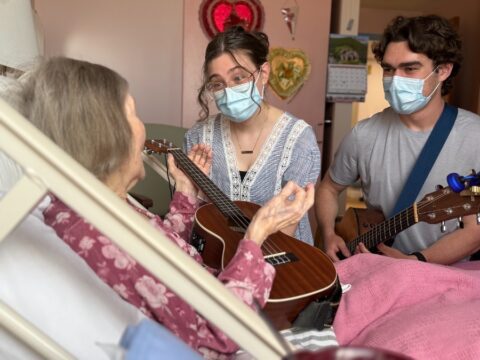My maternal grandmother wasn’t like the other adults I knew as a child. She didn’t have grown-up responsibilities or ask “How’s school?” If one of us kids accidentally slammed a door, she’d yell “You jackass!” in a flash of fury, and seconds later cackle with laughter. She spent hours staring out the window, rubbing the dinner plates with a tea towel long after they had dried.
All I had by way of explanation were the phrases “manic depressive” (now called bipolar disorder) and “lobotomy.” She died when I was 10. There was so much about her that I didn’t understand.
Grandma South came to mind as I read Isaac Würmann’s feature about the intergenerational mental illness in his own family, and whether we inherit these disorders or have a predisposition to them. I can’t confirm diagnoses, but I’m told others in my family suffered from bipolar disorder as well.
My own mom spent her childhood avoiding her mother, who fluctuated between despondency and manic episodes of extravagant shopping. As a girl, my mom didn’t often feel her mother’s love, so she would look at the baby book her mom had made, reassuring herself that surely this was proof of affection.
Grandma South lived in a time before medications for mental health disorders. She had shock therapy and detested it. A Toronto psychiatrist visited their home, my mother recalls, and recommended a lobotomy.
The procedure involves severing the nerve pathways from one or more lobes of the brain to other areas. The first experiments began in the 1880s, but it wasn’t until the mid 1930s and ’40s that this method to calm deeply distressed people became popular. By 1952, an estimated 50,000 patients in the United States and Canada had been lobotomized, the majority of them women. Soon after, the procedure began to fall out of favour with the development of antipsychotics and antidepressants.
More on Broadview:
- Why it’s so hard to find affordable mental health care
- Traditional therapy may not be the answer for men with depression
- What it’s like being married to someone with a severe mental illness
Although this drastic surgery relieved some symptoms, the costs were too high. Patients like my grandmother, who had the surgery in the late 1940s, were left with completely altered personalities: impulsive, inert, unable to concentrate, emotionally blunted.
Still, Grandma South carried on. The woman I met decades later seemed content. She loved The Tommy Hunter Show, was a regular at Grace United in Thornbury, Ont., and held her own at the euchre table. She enjoyed a big party and a hymn sing. She left lipstick kisses on our cheeks, and she adored my dad, who was very kind to her. Without meaning to, she taught me an early lesson in accepting difference in others.
One more thing about Grandma South: her first name was Hope. It might be the most painfully ironic name for a person who suffered as she did. Or perhaps her parents simply intuited what she’d need to persevere through life. In this way, Hope suited her perfectly.
***
Jocelyn Bell is the editor/publisher of Broadview.
This editorial first appeared in the Oct/Nov 2021 issue of Broadview with the title “Grandma’s Illness.”















